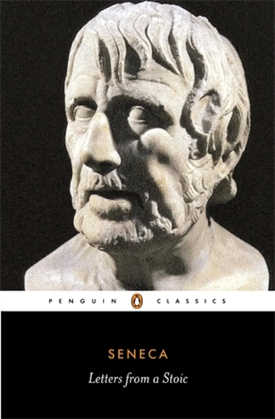
Melbourne’s State Library under lockdown. The wisdom of Seneca can help us through this difficult time. James Ross/AAP
To live through a pandemic, Albert Camus wrote, is to be made to live as an exile. Lovers are parted from lovers, (grand)parents from children, families from their dead. And we are exiled from many things we enjoy: freedom of movement, the ability to eat out or swim at public pools …
In such times, older wisdom traditions can be helpful. The ancient Stoics wrote extensively about facing death, grief, illness, exile and other adversities.
 The Roman Stoic Seneca (4-65 CE), philosopher-counsellor to the emperor Nero, is the author of many letters and dialogues on subjects as diverse as the natural world and virtues like constancy and clemency.
The Roman Stoic Seneca (4-65 CE), philosopher-counsellor to the emperor Nero, is the author of many letters and dialogues on subjects as diverse as the natural world and virtues like constancy and clemency.
When he was exiled by the Emperor Claudius in 41 CE, a fate he would share with several Stoics in this period, Seneca wrote a consolation to his mother to help her deal with his absence.
A basic idea Seneca shares with other Stoics like Musonius Rufus and Epictetus, is that it is not events in the world by themselves that make people suffer. The ideas we form about these events also matter. Our ideas filter what we experience. So, if through reflection, meditation, and reasoning we can change these filters, our experience of the world will alter.
Even the most fortunate people need to learn how to respond when things don’t go as they wish. Here are six counsels a Stoic like Seneca might offer those in lockdown or isolation today.
1. Work with what we can’t change
Lamenting what we can’t change is understandable, but not effective.
We can’t change that COVID-19 exists. We can change how we respond to it. We can stay home, wear masks when we go out, practise social distancing and remind ourselves that these personal inconveniences are there to protect others as well as ourselves — using this as an opportunity to grow our sense of service and community.
2. Be sure
One way to minimise anger, Seneca argues, is to limit your concerns to what you know for sure. If someone tells you something nasty about a third party, you should check whether it is true before leaping to an emotional judgement.
In the same way, if you read something on the internet alleging a conspiracy, before accepting it as true, ask yourself whether you know it for sure. If the answer is “no”, then don’t jump to conclusions.
3. Take an expanded view
The Stoics noticed that we make our hardships worse when we imagine that they are exceptional. So, it puts things in perspective to remember other generations have suffered wars spanning decades, and worse plagues than we are experiencing. This is not, as Seneca writes:
to teach you that this often befalls people […] but to let you know that there have been many who have lightened their misfortunes by patient endurance of them.
Things could be worse. Other individuals, every day, face far greater hardships than we are facing.
4. Choose a model
Remember that the people we most admire didn’t always have it their own way. It is their proven willingness to do the hard things for causes greater than themselves that makes them inspiring.
“For we are naturally disposed to admire more than anything else the man who shows fortitude in adversity,” Seneca observes.
Think of people you look up to, whether athletes, philosophers, scientists, philanthropists, and ask: how would they have responded in our situation?
5. Premeditate the worst, hope and work for the best
Stoics like Seneca knew that our fear and negative emotions strike us hardest when something happens for which we aren’t prepared.
For this reason, they advise us to imaginatively rehearse how we will respond to the worst possible outcomes in advance (like, say... lockdown lasting until December or January).
Forewarned is forearmed. The flipside is that when the worst (hopefully) doesn’t transpire, you can savour the fact that things are comparatively good.
6. Enjoy what is (still) in our power
Remember that if we can’t do many things right now, we can still do others. “I am as joyous and cheerful as in my best days,” Seneca reassures his mum from exile in Corsica:
indeed these days are my best, because my mind is relieved from all pressure of business and is at leisure to attend to its own affairs, and at one time amuses itself with lighter studies, at another eagerly presses its inquiries into its own nature and that of the universe […]
We can’t all be Senecas. But being stuck at home doesn’t stop us from loving, reading, studying, laughing (including at ourselves), listening to music, watching good TV, having great conversations, trying to be patient with our kids […]
“The good things which belong to prosperity are to be wished,” said Seneca, “but the good things that belong to adversity are to be admired,” because they depend on us.
No one wishes for adversity, but Stoic philosophy can help us overcome it.![]()
About the Author
Matthew Sharpe, Associate Professor in Philosophy, Deakin University
This article is republished from The Conversation under a Creative Commons license. Read the original article.
Related Book
Letters from a Stoic
by Lucius Annaeus Seneca
 For several years of his turbulent life, Seneca was the guiding hand of the Roman Empire. His inspired reasoning derived mainly from the Stoic principles, which had originally been developed some centuries earlier in Athens. This selection of Seneca's letters shows him upholding the austere ethical ideals of Stoicism—the wisdom of the self-possessed person immune to overmastering emotions and life’s setbacks—while valuing friendship and the courage of ordinary men, and criticizing the harsh treatment of slaves and the cruelties in the gladiatorial arena. The humanity and wit revealed in Seneca’s interpretation of Stoicism is a moving and inspiring declaration of the dignity of the individual mind.
For several years of his turbulent life, Seneca was the guiding hand of the Roman Empire. His inspired reasoning derived mainly from the Stoic principles, which had originally been developed some centuries earlier in Athens. This selection of Seneca's letters shows him upholding the austere ethical ideals of Stoicism—the wisdom of the self-possessed person immune to overmastering emotions and life’s setbacks—while valuing friendship and the courage of ordinary men, and criticizing the harsh treatment of slaves and the cruelties in the gladiatorial arena. The humanity and wit revealed in Seneca’s interpretation of Stoicism is a moving and inspiring declaration of the dignity of the individual mind.
For more info and/or to order this book, click here. Also available as an Audiobook and as a Kindle edition.

Books Improving Attitude and Behavior from Amazon's Best Sellers list
"Atomic Habits: An Easy & Proven Way to Build Good Habits & Break Bad Ones"
by James Clear
In this book, James Clear presents a comprehensive guide to building good habits and breaking bad ones. The book includes practical advice and strategies for creating lasting behavior change, based on the latest research in psychology and neuroscience.
Click for more info or to order
"Unf*ck Your Brain: Using Science to Get Over Anxiety, Depression, Anger, Freak-Outs, and Triggers"
by Faith G. Harper, PhD, LPC-S, ACS, ACN
In this book, Dr. Faith Harper offers a guide to understanding and managing common emotional and behavioral issues, including anxiety, depression, and anger. The book includes information on the science behind these issues, as well as practical advice and exercises for coping and healing.
Click for more info or to order
"The Power of Habit: Why We Do What We Do in Life and Business"
by Charles Duhigg
In this book, Charles Duhigg explores the science of habit formation and how habits impact our lives, both personally and professionally. The book includes stories of individuals and organizations who have successfully changed their habits, as well as practical advice for creating lasting behavior change.
Click for more info or to order
"Tiny Habits: The Small Changes That Change Everything"
by BJ Fogg
In this book, BJ Fogg presents a guide to creating lasting behavior change through small, incremental habits. The book includes practical advice and strategies for identifying and implementing tiny habits that can lead to big changes over time.
Click for more info or to order
"The 5 AM Club: Own Your Morning, Elevate Your Life"
by Robin Sharma
In this book, Robin Sharma presents a guide to maximizing your productivity and potential by starting your day early. The book includes practical advice and strategies for creating a morning routine that supports your goals and values, as well as inspiring stories of individuals who have transformed their lives through early rising.



























